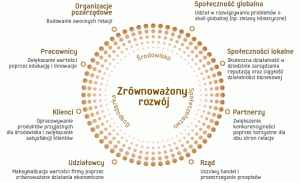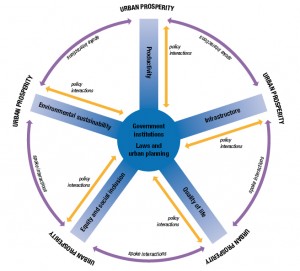The conference in Wrocław was assessed by its participants as very successful. Both, the format (speeches interwoven with films showing best practices in sustainable development) and the organization. The attendees of the Wrocław conference called “Friendly city planning” had an opportunity to read abstracts of all presentations. Every speaker was well prepared for the speech. Here are the abstracts:
Maciej Borsa
The concept of “new urban planning” has been associated with postmodernist composition that draws on traditional urban forms – streets, quarters and squares. The trend started in America as a criticism of the modernist doctrine of functional zoning. In Europe it confronted another reaction. Here the cities are older, more diverse, with explicit historical roots, and what is most important – smaller and growing more slowly than elsewhere. In Europe, the city form depends more on mechanisms that rule its transformation, on architectural shape of buildings, rather than on a single plan. It is also connected with methodological crisis in urban planning, which – to our surprise – we are witnessing in Poland too. The new urban planning concept defines the city as a growing creation connected with numerous processes taking place within and around it. Urban planning, as opposed to building design, takes into account the whole process, including all its stakeholders: public administration, city dwellers and investors. The urban planner circulates among them all and tries to find the balance between many conflicting interests clashing in the city space.
Dominika Brodowicz
In the context of ecology and sustainable development, contemporary cities are faced with numerous challenges connected with environmental protection, air pollution and access to green recreational areas. In democratic countries where social participation and joint decision making are the pillar of the development, these objectives are carried out through joint governance – by informing, consulting and participating in planning and management processes, both ways: municipality <-> local community.
Therefore, the speech will address participation, cooperation as well as two-way education and awareness raising of the society and decision makers in the area of urban ecology. The examples will refer to such projects as The Global Ecovillage Network (GEN), One Planet Living (OPL) i Friends of the Chicago River.
Krzysztof Baczyński
In the face of environmental threats and the need to search for innovative methods of environmental protection, the European Commission supports projects on eco-innovations, especially those carried out on urban areas. In EC Eco-Observatory ranking Poland ranks very low on the list (27th out of 28 EU members). That is why continuous education in this respect is so important, in particular in case of decision makers who have direct influence on the shape of urban space. Best practices applied in European countries (more advanced in this aspect) come as an invaluable aid here. Documentary films with an educational and informative character play a key role in the ECOLOGY CONSTRUCTIVELY project as they show a mixture of experience from abroad. Every episode of the whole film series presents a variety of applied approaches and solutions, depending on the scale and complexity of projects.
Participants of the first conference will see e.g. housing community whose functioning is based on sustainable development principles and the respect for natural environment; application of IT technologies to promote economic sustainable development; regeneration and development of city center postindustrial lands; non-standard concept of spatial planning based on sharing public space by all users equally; three office buildings awarded for innovative ecological solutions; examples of sustainable development ecological projects put into practice and environment-friendly life style; illustration of weaving sustainable development principles into architectural skyscape as well as a modern proecological approach to regeneration of the urban tissue.
Jacek Godlewski
Spatial policies of municipalities and communes favors the development of spontaneous urbanization. Intensive filling up of city blocks changes the urban and suburban landscape resulting in densely built-up space. Housing problems in those blocks are transferred to future owners who are sure about the profitability of the purchase but cannot see the lack of elements that are necessary for proper functioning: parking space, green areas or basic facilities connected with education, culture, entertainment, sports and recreation. The lack of all those facilities that typically make a public space – accessible to all – results in the atrophy of “neighboring units”. Currently, in city and town centers are mainly service and housing sectors, densely built-up, characterized by maximization of indicators and preferred non-ecological architectural solutions.
Janusz Korzeń
National Urban Policy, whose draft is currently up for discussion, is aimed at territorially oriented state actions for sustainable development of cities and their functional areas. It should be followed by other similar documents on the regional level. The current law favors this kind of development but practically it strengthens the processes of suburbanization and growing urban sprawl. This in turn is reflected in space and property management in communes as well as urban planning that is focused on isolated projects instead of spatially coherent structures. Such activities usually satisfy current investment needs, not always in line with principles of sustainable development and integrated development planning. The situation may be improved by initiating inter communal cooperation, especially in terms of urban, metropolitan and agglomerative functional areas.
Katarzyna Sadowy
Urban planning has many stakeholders: public administration representatives, entrepreneurs, city dwellers, planners and experts of various sectors. Participative planning is a process which provides a platform for cooperation, dialogue and problem-solving methods between particular groups and participants of the process. Participative planning also takes engagement, intentions and skills of all partakers. That is why methods and frameworks of such cooperation are necessary. The speaker will address ways of identifying stakeholders and engaging them in the planning process.
Urban planning must be multidisciplinary and take into account spatial, economic, social and environmental aspects – not separately but as elements of one planning process. For this reason proper analysis of resources and risks on a given area is of crucial importance. By urban resources we mean spatial elements such as urban layout and landscape; built-up space where architectural quality plays a key role, technical condition and functional adaptation; natural resources connected with the environment and climate; infrastructure (utility lines and growth potential); economic connected with businesses and research centers together with its potential (financial and organizational) and finally human resources composed of know-how, education and qualification of the inhabitants plus social bonds and culture. Planning must use the resources properly, eliminate possible risks and grabbing chances as they go.
Particular emphasize will be placed on planning aspects connected with the environment, consequences of planning decisions on specific users of urban space as well as methods of measuring and evaluating city growth from the aspect of sustainable development. Change of behavior, shifting priorities from the profit to environmental protection, trust in sustainable and high quality solutions cannot be done overnight. It is a process of changes in mentality, awareness and society and it takes time. The beginning is behind us.
This material has been published thanks to the financial support of the National Fund for Environmental Protection and Water Management. The sole responsibility for its contents lies with Collegium Mazovia.







Leave a Reply
You must be logged in to post a comment.